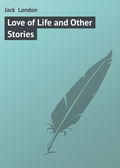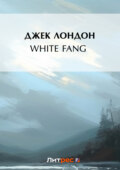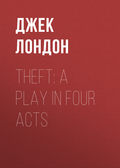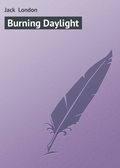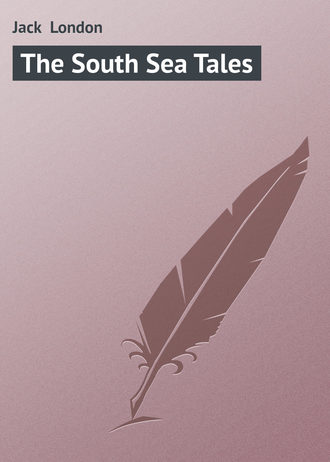
Джек Лондон
The South Sea Tales
"Every house on every smallest island was burned. Not a pig nor a fowl was left alive. Our wells were defiled with the bodies of the slain, or else heaped high with coral rock. We were twenty-five thousand on Oolong before the three schooners came. Today we are five thousand. After the schooners left, we were but three thousand, as you shall see.
"At last the three schooners grew tired of chasing us back and forth. So they went, the three of them, to Nihi, in the northeast. And then they drove us steadily to the west. Their nine boats were in the water as well. They beat up every island as they moved along. They drove us, drove us, drove us day by day. And every night the three schooners and the nine boats made a chain of watchfulness that stretched across the lagoon from rim to rim, so that we could not escape back.
"They could not drive us forever that way, for the lagoon was only so large, and at last all of us that yet lived were driven upon the last sand bank to the west. Beyond lay the open sea. There were ten thousand of us, and we covered the sand bank from the lagoon edge to the pounding surf on the other side. No one could lie down. There was no room. We stood hip to hip and shoulder to shoulder. Two days they kept us there, and the mate would climb up in the rigging to mock us and yell, Yah! Yah! Yah!' till we were well sorry that we had ever harmed him or his schooner a month before. We had no food, and we stood on our feet two days and nights. The little babies died, and the old and weak died, and the wounded died. And worst of all, we had no water to quench our thirst, and for two days the sun beat down on us, and there was no shade. Many men and women waded out into the ocean and were drowned, the surf casting their bodies back on the beach. And there came a pest of flies. Some men swam to the sides of the schooners, but they were shot to the last one. And we that lived were very sorry that in our pride we tried to take the schooner with the three masts that came to fish for beche-de-mer.
"On the morning of the third day came the skippers of the three schooners and that mate in a small boat. They carried rifles, all of them, and revolvers, and they made talk. It was only that they were weary of killing us that they had stopped, they told us. And we told them that we were sorry, that never again would we harm a white man, and in token of our submission we poured sand upon our heads. And all the women and children set up a great wailing for water, so that for some time no man could make himself heard. Then we were told our punishment. We must fill the three schooners with copra and beche-de-mer. And we agreed, for we wanted water, and our hearts were broken, and we knew that we were children at fighting when we fought with white men who fight like hell. And when all the talk was finished, the mate stood up and mocked us, and yelled, Yah! Yah! Yah!' After that we paddled away in our canoes and sought water.
"And for weeks we toiled at catching beche-de-mer and curing it, in gathering the cocoanuts and turning them into copra. By day and night the smoke rose in clouds from all the beaches of all the islands of Oolong as we paid the penalty of our wrongdoing. For in those days of death it was burned clearly on all our brains that it was very wrong to harm a white man.
"By and by, the schooners full of copra and beche-de-mer and our trees empty of cocoanuts, the three skippers and that mate called us all together for a big talk. And they said they were very glad that we had learned our lesson, and we said for the ten-thousandth time that we were sorry and that we would not do it again. Also, we poured sand upon our heads. Then the skippers said that it was all very well, but just to show us that they did not forget us, they would send a devil-devil that we would never forget and that we would always remember any time we might feel like harming a white man. After that the mate mocked us one more time and yelled, Yah! Yah! Yah!' Then six of our men, whom we thought long dead, were put ashore from one of the schooners, and the schooners hoisted their sails and ran out through the passage for the Solomons.
"The six men who were put ashore were the first to catch the devil-devil the skippers sent back after us."
"A great sickness came," I interrupted, for I recognized the trick. The schooner had had measles on board, and the six prisoners had been deliberately exposed to it.
"Yes, a great sickness," Oti went on. "It was a powerful devil-devil. The oldest man had never heard of the like. Those of our priests that yet lived we killed because they could not overcome the devil-devil. The sickness spread. I have said that there were ten thousand of us that stood hip to hip and shoulder to shoulder on the sandbank. When the sickness left us, there were three thousand yet alive. Also, having made all our cocoanuts into copra, there was a famine.
"That fella trader," Oti concluded, "he like 'm that much dirt. He like 'm clam he die KAI-KAI (meat) he stop, stink 'm any amount. He like 'm one fella dog, one sick fella dog plenty fleas stop along him. We no fright along that fella trader. We fright because he white man. We savve plenty too much no good kill white man. That one fella sick dog trader he plenty brother stop along him, white men like 'm you fight like hell. We no fright that damn trader. Some time he made kanaka plenty cross along him and kanaka want 'm kill m, kanaka he think devil-devil and kanaka he hear that fella mate sing out, Yah! Yah! Yah!' and kanaka no kill m."
Oti baited his hook with a piece of squid, which he tore with his teeth from the live and squirming monster, and hook and bait sank in white flames to the bottom.
"Shark walk about he finish," he said. "I think we catch 'm plenty fella fish."
His line jerked savagely. He pulled it in rapidly, hand under hand, and landed a big gasping rock cod in the bottom of the canoe.
"Sun he come up, I make 'm that dam fella trader one present big fella fish," said Oti.
The Heathen
I met him first in a hurricane; and though we had gone through the hurricane on the same schooner, it was not until the schooner had gone to pieces under us that I first laid eyes on him. Without doubt I had seen him with the rest of the kanaka crew on board, but I had not consciously been aware of his existence, for the Petite Jeanne was rather overcrowded. In addition to her eight or ten kanaka seamen, her white captain, mate, and supercargo, and her six cabin passengers, she sailed from Rangiroa with something like eighty-five deck passengers— Paumotans and Tahitians, men, women, and children each with a trade box, to say nothing of sleeping mats, blankets, and clothes bundles.
The pearling season in the Paumotus was over, and all hands were returning to Tahiti. The six of us cabin passengers were pearl buyers. Two were Americans, one was Ah Choon (the whitest Chinese I have ever known), one was a German, one was a Polish Jew, and I completed the half dozen.
It had been a prosperous season. Not one of us had cause for complaint, nor one of the eighty-five deck passengers either. All had done well, and all were looking forward to a rest-off and a good time in Papeete.
Of course, the Petite Jeanne was overloaded. She was only seventy tons, and she had no right to carry a tithe of the mob she had on board. Beneath her hatches she was crammed and jammed with pearl shell and copra. Even the trade room was packed full with shell. It was a miracle that the sailors could work her. There was no moving about the decks. They simply climbed back and forth along the rails.
In the night time they walked upon the sleepers, who carpeted the deck, I'll swear, two deep. Oh! And there were pigs and chickens on deck, and sacks of yams, while every conceivable place was festooned with strings of drinking cocoanuts and bunches of bananas. On both sides, between the fore and main shrouds, guys had been stretched, just low enough for the foreboom to swing clear; and from each of these guys at least fifty bunches of bananas were suspended.
It promised to be a messy passage, even if we did make it in the two or three days that would have been required if the southeast trades had been blowing fresh. But they weren't blowing fresh. After the first five hours the trade died away in a dozen or so gasping fans. The calm continued all that night and the next day—one of those glaring, glassy, calms, when the very thought of opening one's eyes to look at it is sufficient to cause a headache.
The second day a man died—an Easter Islander, one of the best divers that season in the lagoon. Smallpox—that is what it was; though how smallpox could come on board, when there had been no known cases ashore when we left Rangiroa, is beyond me. There it was, though—smallpox, a man dead, and three others down on their backs.
There was nothing to be done. We could not segregate the sick, nor could we care for them. We were packed like sardines. There was nothing to do but rot and die—that is, there was nothing to do after the night that followed the first death. On that night, the mate, the supercargo, the Polish Jew, and four native divers sneaked away in the large whale boat. They were never heard of again. In the morning the captain promptly scuttled the remaining boats, and there we were.
That day there were two deaths; the following day three; then it jumped to eight. It was curious to see how we took it. The natives, for instance, fell into a condition of dumb, stolid fear. The captain—Oudouse, his name was, a Frenchman—became very nervous and voluble. He actually got the twitches. He was a large fleshy man, weighing at least two hundred pounds, and he quickly became a faithful representation of a quivering jelly-mountain of fat.
The German, the two Americans, and myself bought up all the Scotch whiskey, and proceeded to stay drunk. The theory was beautiful—namely, if we kept ourselves soaked in alcohol, every smallpox germ that came into contact with us would immediately be scorched to a cinder. And the theory worked, though I must confess that neither Captain Oudouse nor Ah Choon were attacked by the disease either. The Frenchman did not drink at all, while Ah Choon restricted himself to one drink daily.
It was a pretty time. The sun, going into northern declination, was straight overhead. There was no wind, except for frequent squalls, which blew fiercely for from five minutes to half an hour, and wound up by deluging us with rain. After each squall, the awful sun would come out, drawing clouds of steam from the soaked decks.
The steam was not nice. It was the vapor of death, freighted with millions and millions of germs. We always took another drink when we saw it going up from the dead and dying, and usually we took two or three more drinks, mixing them exceptionally stiff. Also, we made it a rule to take an additional several each time they hove the dead over to the sharks that swarmed about us.
We had a week of it, and then the whiskey gave out. It is just as well, or I shouldn't be alive now. It took a sober man to pull through what followed, as you will agree when I mention the little fact that only two men did pull through. The other man was the heathen—at least, that was what I heard Captain Oudouse call him at the moment I first became aware of the heathen's existence. But to come back.
It was at the end of the week, with the whiskey gone, and the pearl buyers sober, that I happened to glance at the barometer that hung in the cabin companionway. Its normal register in the Paumotus was 29.90, and it was quite customary to see it vacillate between 29.85 and 30.00, or even 30.05; but to see it as I saw it, down to 29.62, was sufficient to sober the most drunken pearl buyer that ever incinerated smallpox microbes in Scotch whiskey.
I called Captain Oudouse's attention to it, only to be informed that he had watched it going down for several hours. There was little to do, but that little he did very well, considering the circumstances. He took off the light sails, shortened right down to storm canvas, spread life lines, and waited for the wind. His mistake lay in what he did after the wind came. He hove to on the port tack, which was the right thing to do south of the Equator, if—and there was the rub—IF one were NOT in the direct path of the hurricane.
We were in the direct path. I could see that by the steady increase of the wind and the equally steady fall of the barometer. I wanted him to turn and run with the wind on the port quarter until the barometer ceased falling, and then to heave to. We argued till he was reduced to hysteria, but budge he would not. The worst of it was that I could not get the rest of the pearl buyers to back me up. Who was I, anyway, to know more about the sea and its ways than a properly qualified captain? was what was in their minds, I knew.
Of course, the sea rose with the wind frightfully; and I shall never forget the first three seas the Petite Jeanne shipped. She had fallen off, as vessels do at times when hove to, and the first sea made a clean breach. The life lines were only for the strong and well, and little good were they even for them when the women and children, the bananas and cocoanuts, the pigs and trade boxes, the sick and the dying, were swept along in a solid, screeching, groaning mass.
The second sea filled the Petite Jeanne'S decks flush with the rails; and, as her stern sank down and her bow tossed skyward, all the miserable dunnage of life and luggage poured aft. It was a human torrent. They came head first, feet first, sidewise, rolling over and over, twisting, squirming, writhing, and crumpling up. Now and again one caught a grip on a stanchion or a rope; but the weight of the bodies behind tore such grips loose.
One man I noticed fetch up, head on and square on, with the starboard bitt. His head cracked like an egg. I saw what was coming, sprang on top of the cabin, and from there into the mainsail itself. Ah Choon and one of the Americans tried to follow me, but I was one jump ahead of them. The American was swept away and over the stern like a piece of chaff. Ah Choon caught a spoke of the wheel, and swung in behind it. But a strapping Raratonga vahine (woman)—she must have weighed two hundred and fifty—brought up against him, and got an arm around his neck. He clutched the kanaka steersman with his other hand; and just at that moment the schooner flung down to starboard.
The rush of bodies and sea that was coming along the port runway between the cabin and the rail turned abruptly and poured to starboard. Away they went—vahine, Ah Choon, and steersman; and I swear I saw Ah Choon grin at me with philosophic resignation as he cleared the rail and went under.
The third sea—the biggest of the three—did not do so much damage. By the time it arrived nearly everybody was in the rigging. On deck perhaps a dozen gasping, half-drowned, and half-stunned wretches were rolling about or attempting to crawl into safety. They went by the board, as did the wreckage of the two remaining boats. The other pearl buyers and myself, between seas, managed to get about fifteen women and children into the cabin, and battened down. Little good it did the poor creatures in the end.
Wind? Out of all my experience I could not have believed it possible for the wind to blow as it did. There is no describing it. How can one describe a nightmare? It was the same way with that wind. It tore the clothes off our bodies. I say TORE THEM OFF, and I mean it. I am not asking you to believe it. I am merely telling something that I saw and felt. There are times when I do not believe it myself. I went through it, and that is enough. One could not face that wind and live. It was a monstrous thing, and the most monstrous thing about it was that it increased and continued to increase.
Imagine countless millions and billions of tons of sand. Imagine this sand tearing along at ninety, a hundred, a hundred and twenty, or any other number of miles per hour. Imagine, further, this sand to be invisible, impalpable, yet to retain all the weight and density of sand. Do all this, and you may get a vague inkling of what that wind was like.
Perhaps sand is not the right comparison. Consider it mud, invisible, impalpable, but heavy as mud. Nay, it goes beyond that. Consider every molecule of air to be a mudbank in itself. Then try to imagine the multitudinous impact of mudbanks. No; it is beyond me. Language may be adequate to express the ordinary conditions of life, but it cannot possibly express any of the conditions of so enormous a blast of wind. It would have been better had I stuck by my original intention of not attempting a description.
I will say this much: The sea, which had risen at first, was beaten down by that wind. 'more: it seemed as if the whole ocean had been sucked up in the maw of the hurricane, and hurled on through that portion of space which previously had been occupied by the air.
Of course, our canvas had gone long before. But Captain Oudouse had on the Petite Jeanne something I had never before seen on a South Sea schooner—a sea anchor. It was a conical canvas bag, the mouth of which was kept open by a huge loop of iron. The sea anchor was bridled something like a kite, so that it bit into the water as a kite bites into the air, but with a difference. The sea anchor remained just under the surface of the ocean in a perpendicular position. A long line, in turn, connected it with the schooner. As a result, the Petite Jeanne rode bow on to the wind and to what sea there was.
The situation really would have been favorable had we not been in the path of the storm. True, the wind itself tore our canvas out of the gaskets, jerked out our topmasts, and made a raffle of our running gear, but still we would have come through nicely had we not been square in front of the advancing storm center. That was what fixed us. I was in a state of stunned, numbed, paralyzed collapse from enduring the impact of the wind, and I think I was just about ready to give up and die when the center smote us. The blow we received was an absolute lull. There was not a breath of air. The effect on one was sickening.
Remember that for hours we had been at terrific muscular tension, withstanding the awful pressure of that wind. And then, suddenly, the pressure was removed. I know that I felt as though I was about to expand, to fly apart in all directions. It seemed as if every atom composing my body was repelling every other atom and was on the verge of rushing off irresistibly into space. But that lasted only for a moment. Destruction was upon us.
In the absence of the wind and pressure the sea rose. It jumped, it leaped, it soared straight toward the clouds. Remember, from every point of the compass that inconceivable wind was blowing in toward the center of calm. The result was that the seas sprang up from every point of the compass. There was no wind to check them. They popped up like corks released from the bottom of a pail of water. There was no system to them, no stability. They were hollow, maniacal seas. They were eighty feet high at the least. They were not seas at all. They resembled no sea a man had ever seen.
They were splashes, monstrous splashes—that is all. Splashes that were eighty feet high. Eighty! They were more than eighty. They went over our mastheads. They were spouts, explosions. They were drunken. They fell anywhere, anyhow. They jostled one another; they collided. They rushed together and collapsed upon one another, or fell apart like a thousand waterfalls all at once. It was no ocean any man had ever dreamed of, that hurricane center. It was confusion thrice confounded. It was anarchy. It was a hell pit of sea water gone mad.
The Petite Jeanne? I don't know. The heathen told me afterwards that he did not know. She was literally torn apart, ripped wide open, beaten into a pulp, smashed into kindling wood, annihilated. When I came to I was in the water, swimming automatically, though I was about two-thirds drowned. How I got there I had no recollection. I remembered seeing the Petite Jeanne fly to pieces at what must have been the instant that my own consciousness was buffeted out of me. But there I was, with nothing to do but make the best of it, and in that best there was little promise. The wind was blowing again, the sea was much smaller and more regular, and I knew that I had passed through the center. Fortunately, there were no sharks about. The hurricane had dissipated the ravenous horde that had surrounded the death ship and fed off the dead.
It was about midday when the Petite Jeanne went to pieces, and it must have been two hours afterwards when I picked up with one of her hatch covers. Thick rain was driving at the time; and it was the merest chance that flung me and the hatch cover together. A short length of line was trailing from the rope handle; and I knew that I was good for a day, at least, if the sharks did not return. Three hours later, possibly a little longer, sticking close to the cover, and with closed eyes, concentrating my whole soul upon the task of breathing in enough air to keep me going and at the same time of avoiding breathing in enough water to drown me, it seemed to me that I heard voices. The rain had ceased, and wind and sea were easing marvelously. Not twenty feet away from me, on another hatch cover were Captain Oudouse and the heathen. They were fighting over the possession of the cover—at least, the Frenchman was. "Paien noir!" I heard him scream, and at the same time I saw him kick the kanaka.
Now, Captain Oudouse had lost all his clothes, except his shoes, and they were heavy brogans. It was a cruel blow, for it caught the heathen on the mouth and the point of the chin, half stunning him. I looked for him to retaliate, but he contented himself with swimming about forlornly a safe ten feet away. Whenever a fling of the sea threw him closer, the Frenchman, hanging on with his hands, kicked out at him with both feet. Also, at the moment of delivering each kick, he called the kanaka a black heathen.
"For two centimes I'd come over there and drown you, you white beast!" I yelled.
The only reason I did not go was that I felt too tired. The very thought of the effort to swim over was nauseating. So I called to the kanaka to come to me, and proceeded to share the hatch cover with him. Otoo, he told me his name was (pronounced o-to-o ); also, he told me that he was a native of Bora Bora, the most westerly of the Society Group. As I learned afterward, he had got the hatch cover first, and, after some time, encountering Captain Oudouse, had offered to share it with him, and had been kicked off for his pains.
And that was how Otoo and I first came together. He was no fighter. He was all sweetness and gentleness, a love creature, though he stood nearly six feet tall and was muscled like a gladiator. He was no fighter, but he was also no coward. He had the heart of a lion; and in the years that followed I have seen him run risks that I would never dream of taking. What I mean is that while he was no fighter, and while he always avoided precipitating a row, he never ran away from trouble when it started. And it was "Ware shoal!" when once Otoo went into action. I shall never forget what he did to Bill King. It occurred in German Samoa. Bill King was hailed the champion heavyweight of the American Navy. He was a big brute of a man, a veritable gorilla, one of those hard-hitting, rough-housing chaps, and clever with his fists as well. He picked the quarrel, and he kicked Otoo twice and struck him once before Otoo felt it to be necessary to fight. I don't think it lasted four minutes, at the end of which time Bill King was the unhappy possessor of four broken ribs, a broken forearm, and a dislocated shoulder blade. Otoo knew nothing of scientific boxing. He was merely a manhandler; and Bill King was something like three months in recovering from the bit of manhandling he received that afternoon on Apia beach.
But I am running ahead of my yarn. We shared the hatch cover between us. We took turn and turn about, one lying flat on the cover and resting, while the other, submerged to the neck, merely held on with his hands. For two days and nights, spell and spell, on the cover and in the water, we drifted over the ocean. Towards the last I was delirious most of the time; and there were times, too, when I heard Otoo babbling and raving in his native tongue. Our continuous immersion prevented us from dying of thirst, though the sea water and the sunshine gave us the prettiest imaginable combination of salt pickle and sunburn.
In the end, Otoo saved my life; for I came to lying on the beach twenty feet from the water, sheltered from the sun by a couple of cocoanut leaves. No one but Otoo could have dragged me there and stuck up the leaves for shade. He was lying beside me. I went off again; and the next time I came round, it was cool and starry night, and Otoo was pressing a drinking cocoanut to my lips.
We were the sole survivors of the Petite Jeanne. Captain Oudouse must have succumbed to exhaustion, for several days later his hatch cover drifted ashore without him. Otoo and I lived with the natives of the atoll for a week, when we were rescued by the French cruiser and taken to Tahiti. In the meantime, however, we had performed the ceremony of exchanging names. In the South Seas such a ceremony binds two men closer together than blood brothership. The initiative had been mine; and Otoo was rapturously delighted when I suggested it.
"It is well," he said, in Tahitian. "For we have been mates together for two days on the lips of Death."
"But death stuttered," I smiled.
"It was a brave deed you did, master," he replied, "and Death was not vile enough to speak."
"Why do you 'master' me?" I demanded, with a show of hurt feelings. "We have exchanged names. To you I am Otoo. To me you are Charley. And between you and me, forever and forever, you shall be Charley, and I shall be Otoo. It is the way of the custom. And when we die, if it does happen that we live again somewhere beyond the stars and the sky, still shall you be Charley to me, and I Otoo to you."
"Yes, master," he answered, his eyes luminous and soft with joy.
"There you go!" I cried indignantly.
"What does it matter what my lips utter?" he argued. "They are only my lips. But I shall think Otoo always. Whenever I think of myself, I shall think of you. Whenever men call me by name, I shall think of you. And beyond the sky and beyond the stars, always and forever, you shall be Otoo to me. Is it well, master?"
I hid my smile, and answered that it was well.
We parted at Papeete. I remained ashore to recuperate; and he went on in a cutter to his own island, Bora Bora. Six weeks later he was back. I was surprised, for he had told me of his wife, and said that he was returning to her, and would give over sailing on far voyages.
"Where do you go, master?" he asked, after our first greetings.
I shrugged my shoulders. It was a hard question.
"All the world," was my answer—"all the world, all the sea, and all the islands that are in the sea."
"I will go with you," he said simply. "My wife is dead."
I never had a brother; but from what I have seen of other men's brothers, I doubt if any man ever had a brother that was to him what Otoo was to me. He was brother and father and mother as well. And this I know: I lived a straighter and better man because of Otoo. I cared little for other men, but I had to live straight in Otoo's eyes. Because of him I dared not tarnish myself. He made me his ideal, compounding me, I fear, chiefly out of his own love and worship and there were times when I stood close to the steep pitch of hell, and would have taken the plunge had not the thought of Otoo restrained me. His pride in me entered into me, until it became one of the major rules in my personal code to do nothing that would diminish that pride of his.
Naturally, I did not learn right away what his feelings were toward me. He never criticized, never censured; and slowly the exalted place I held in his eyes dawned upon me, and slowly I grew to comprehend the hurt I could inflict upon him by being anything less than my best.
For seventeen years we were together; for seventeen years he was at my shoulder, watching while I slept, nursing me through fever and wounds—ay, and receiving wounds in fighting for me. He signed on the same ships with me; and together we ranged the Pacific from Hawaii to Sydney Head, and from Torres Straits to the Galapagos. We blackbirded from the New Hebrides and the Line Islands over to the westward clear through the Louisades, New Britain, New Ireland, and New Hanover. We were wrecked three times—in the Gilberts, in the Santa Cruz group, and in the Fijis. And we traded and salved wherever a dollar promised in the way of pearl and pearl shell, copra, beche-de-mer, hawkbill turtle shell, and stranded wrecks.
It began in Papeete, immediately after his announcement that he was going with me over all the sea, and the islands in the midst thereof. There was a club in those days in Papeete, where the pearlers, traders, captains, and riffraff of South Sea adventurers forgathered. The play ran high, and the drink ran high; and I am very much afraid that I kept later hours than were becoming or proper. No matter what the hour was when I left the club, there was Otoo waiting to see me safely home.
At first I smiled; next I chided him. Then I told him flatly that I stood in need of no wet-nursing. After that I did not see him when I came out of the club. Quite by accident, a week or so later, I discovered that he still saw me home, lurking across the street among the shadows of the mango trees. What could I do? I know what I did do.




